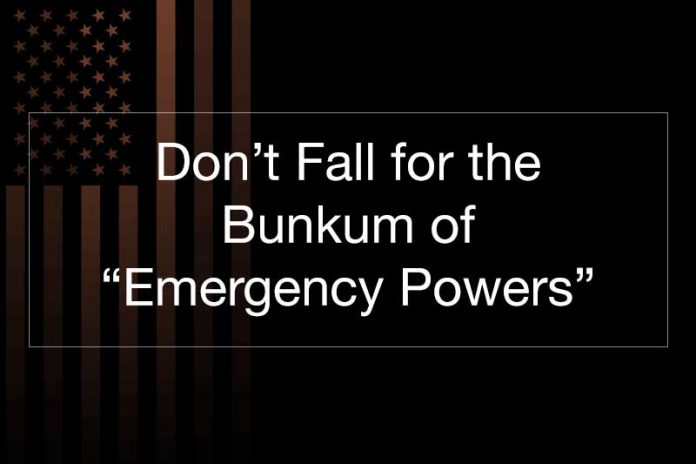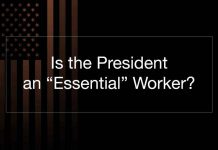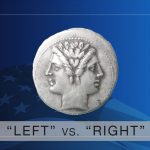Last Updated on January 16, 2021 by Constitutional Militia
No observer of contemporary socio-political psychopathology can be anything but amazed at the numerous voices of doom who announce in breathless tones or hysterical prose that America no longer has a Constitution or a limited government, because she is under the gun of sweeping “emergency powers” that pursuant to these supposed powers Congress may behave as a virtual Supreme Soviet and the President as a virtual dictator—and that therefore the Republic is dead, patriotism is futile, and all is lost.
Amazement, however, need not entail acceptance. To the contrary: The more one hears or reads this stuff, the more he becomes convinced of the truth in the wag’s dictum that “You can fool some of the people all of the time, and all of the people some of the time and that’s good enough!” Of course, the encouraging corollary of this rule is that one can enlighten some of the people all of the time, and all of the people some of the time—and, therefore, trying to do so can possibly be worth the effort.
An extra effort is warranted in this case, because the notion that “emergency powers” are aces of usurpation and tyranny capable of trumping the Constitution is so devoid of substance, politically defeatist, and deadly to America’s survival as an independent, free, and prosperous nation that one must wonder whether it was not originally generated, and is now broadcast predominately, by propagandists for the New World Order and other perverse designs of the Forces of Darkness, precisely to dupe constitutionally illiterate Americans into surrendering without a fight.
In the ancient Roman Republic, the Senate could appoint a temporary dictator, and invest him with specific and often sweeping powers, to deal with extraordinary conditions. And on both sides of the wall behind the Speaker’s desk in the United States House of Representatives are prominently displayed Roman fasces: an ax within a bundle of sticks, symbolizing the plenitude of governmental power—a classical representation of Mao Tse-tung’s epigram that “[p]olitical power grows out of the barrel of a gun.” The illusions of modern politicians aside, however, that historical allusion does not invest Congress with all the powers of the Roman Senate, let alone a license to arm the President with the authority of an ancient Roman dictator—or of a latter-day Duce (although the regimes to which Americans have unfortunately become accustomed in Washington are more and more taking on an opera buffa character that makes Mussolini appear a not- so-ludicrous figure by comparison).
The modern doctrine of “emergency powers” is striking because—unlike the authority of the ancient Roman Senate to appoint a dictator—“emergency powers” lack both a specific source in the Constitution and a definition. Obviously, if the Constitution contained a clause explicitly delegating to Congress “emergency powers,” delineating the content of such powers, and setting out specific conditions under which they could be exercised, by whom, and for what purposes, no one could complain. No such provision exists in the Constitution, however. Today, officeholders simply announce that an “emergency” exists and that they are assuming “emergency powers” to deal with it— with both the erstwhile “emergency” and the “powers” unilaterally defined by them without reference to anything in the Constitution. To any legally literate individual, this situation should be intolerable.
First, the modern doctrine of “emergency powers” negates constitutionalism in general. By definition, a “constitution” is a charter of defined and therefore limited government . In contrast, the doctrine of “emergency powers” is an apology for undefined and therefore unlimited government. No so-called “constitution” subject to the unilateral assertion of “emergency powers” by public officials could possibly survive. For, by hypothesis, no such “constitution” would in any way limit those officials, who could relax or remove its restrictions on their own initiative simply by saying that some situation had arisen that licensed them to overstep its boundaries. If, all of a sudden, an “emergency”—as self-interested, power- hungry politicians and special-interest groups might define it—could beget new, theretofore unheard-of powers, constitutionalism itself would disappear, ushering in “government” limited only by its own rhetoric, with political hysteria the measure of “law.” Indeed, in any country populated by rational citizens, such a self-destructive “constitution” could never even come into existence. Only veritable political idiots would propose or write, let alone ratify, such a ridiculous document.
Second, the modern doctrine of “emergency powers” runs afoul of America’s Constitution in particular. Anyone who bothers to read the Constitution will see that it
- delegates to the General Government as a whole—or to Congress, the President, or the Supreme Court separately—no “emergency powers” eo nomine;
- delegates neither powers that only an “emergency” can call into existence, nor powers that may be exercised only in an “emergency”;
- delegates no power even to declare that an “emergency” exists; and, perhaps most decisively of all,
- does not even employ the word “emergency”, let alone define it as a legal principle relevant to any part of “the supreme Law of the Land” (Article VI, Clause 2).
Thus, constitutionally speaking, “emergency” has nether place nor meaning, and therefore by itself cannot serve as the justification for or measure of any power whatsoever.
Even the Supreme Court has recognized, as a fundamental constitutional principle, that
[e]mergency does not create power. Emergency does not increase granted power or remove or diminish the restrictions upon power granted or reserved. The Constitution was adopted in a period of grave emergency. Its grants of power to the Federal Government and its limitations of the power of the States were determined in the light of emergency and they are not altered by emergency.
Home Building & Loan Association v. Blaisdell, 290 U.S. 398, 425 (1934).
The existence of some situation that self-serving politicians label an “emergency” has no constitutional effect in and of itself. Neither a “grave national crisis” nor any other “[e]xtraordinary conditions” can
create or enlarge constitutional power. The Constitution established a national government with powers deemed to be adequate, * * * but these powers * * * are limited by the constitutional grants. Those who act under these grants are not at liberty to transcend the imposed limits because they believe that more or different power is necessary.
A.L.A. Schechter Poultry Corp. v. United States, 295 U.S. 495, 528-29 (1935).
In short, Congress, the President, and the Supreme Court—and the States, subject to their own constitutions—have no more authority to expand their powers (or evade their disabilities) simply by declaring an “emergency” than by screaming “shazaam.”
This is obviously not because the Founding Fathers negligently overlooked the possibility of “emergencies” in this country’s future. For example, the Constitution provides for a Congressional declaration of “War” (Article I, Section 8, Clause 11)— surely an “emergency” in the commonsensical understanding of that term. Yet even the “existence of a state of war could not suspend or change the operation upon the power of Congress of the guarantees and limitations of the Fifth * * * Amendment.” United States v. L. Cohen Grocery Co., 255 U.S. 81, 88 (1921). In addition, the Constitution recognizes certain other extraordinary, and possibly “emergency,” situations as predicates or conditions precedent for the exercise of specific powers explicitly granted. For instance, “[t]he Privilege of the Writ of Habeas Corpus shall not be suspended, unless when in Cases of Rebellion or Invasion the public Safety may require it.” Article I, Section 9, Clause 2 (emphasis supplied). Congress may “provide for calling forth the Militia to execute the Laws of the Union, suppress Insurrections and repel Invasions.” Article I, Section 8, Clause 15 (emphasis supplied). And the Fifth Amendment commands that “[n]o person shall be held to answer for a capital, or otherwise infamous crime, unless on a presentment or indictment of a Grand Jury, except in cases arising in the land or naval forces, or in the Militia when in actual service in time of War or public danger” (emphasis supplied).
Thus, the Constitution itself exposes the claim that an “emergency” creates new powers as nothing but a trick political con men employ to confuse and stampede Americans into acquiescing in legislative or executive action that they would otherwise recognize and condemn as dangerous hogwash. It is double- talk for the purpose of double-dealing. Legitimate governmental powers have nothing to do with it. If such powers actually existed, their proponents would not have to append the desperate adjective “emergency.” The real “emergency” that confronts Americas in every such case is the lust of aspiring and conspiring usurpers and tyrants for powers that We the People have withheld from all public officials, doubtlessly for good and sufficient reasons. If honest public officials actually need new or expanded powers to serve the common good, the only legitimate way to obtain them is to propose amendments to the Constitution—and then see how many Americans agree, when all the particulars are laid on the table for careful examination and untrammeled debate.
So, all the talk being spouted and ink being spilled about how “emergency powers” have permanently overwhelmed the Constitution are just bird seed for bird brains. And one has to be a pretty potted pigeon to swallow them. That this trick has succeeded so well, for so long, proves how politically dopey all too many Americans have been and still remain. Those who recoil at this characterization should look in a mirror as truthful as the one that confronted the Wicked Queen in “Snow White” and ask the face that appears how else could such a childish swindle have been put over, year after year, decade after decade, even unto this very day.
That answer in hand, though, the further question nevertheless remains: Now what do patriotic Americans intend to do about it? For part 2 click below.




































